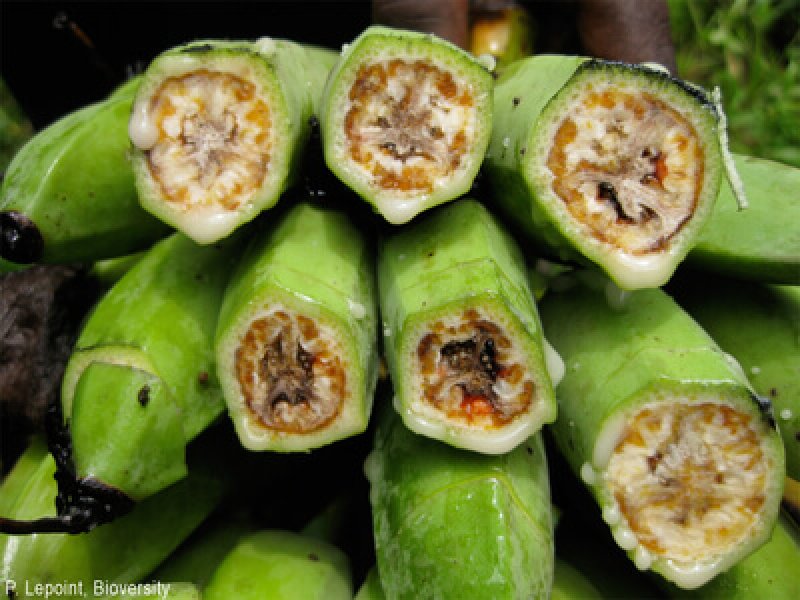Uganda’s number one staple, banana, locally known as matooke has been under attack by a bacterial disease, banana xanthomonas wilt, that causes the plant to wilt away or to ripen prematurely and rot away. The disease that has taken a decade continues to threaten the household food security of many Ugandans.
Cultural control measures like uprooting plants with symptoms, cutting the male buds, and to a lesser extent adoption of disease free tissue culture planting materials have tried to curb the spread. These control methods seem not to be sustainable. In desperation, local authorities are arresting farmers who “allow” their plantation to get infected. But farmers have no way of knowing that healthy looking plants might actually be infected, but only appear healthy for a short time. Four farmers in Uganda’s rural area of Bushenyi were recently arrested in an operation that the authorities say will take up to a month and will likely result in more arrests.
As these farmers are being punished for committing the crime of growing a susceptible variety of banana, Ugandan scientists have developed transgenic banana varieties that are 100% resistant to the wilt. The GMO rescue is being blocked, at least for now, by anti-GMO activists.
Why is it taking long for Ugandan farmers to get access to resistant transgenic varieties?
The current resistant transgenic lines have already been tested in trials over three generations and the resistance have not broken down. What is left, aside further safety tests, is to subject these crops to various ecological conditions across the country to select the best lines for farmers. Uganda lacks a comprehensive regulatory framework to govern the processes beyond the trials; the existing law only allows for research. The Biotechnology and Biosafety Bill that the activists have been fighting to block would, if passed, establish a competent authority to oversee the research and deregulation process and path the way to commercialization. Without the law these resistant varieties will remain in laboratories rather than in fields, and farmers and the public will be helpless to confront the spread of the disease that is wiping away their main source of food.
ActionAid has led the demonization campaigns. After several embarrassing investigations into its anti-GMO propaganda efforts, the NGO “repentened” for propagating non-factual information about GMOs, but then continued its campaign covertly. With ActionAid in retreat, the majority party in Uganda’s parliament endorsed the Biosafety Bill, and endorsements followed from a good number of legislators on the minority side. The activists are not doing well either in Tanzania. When Tanzanian ministers and legislators visited Uganda’s research facilities, they returned and amended its formerly prohibitive law to allow research to be conducted without undue encumbrances.
No activists have come to the defense of the poor subsistence farmers who are being arrested because the banana wilt is sweeping through their plantations. Claims that their real goal is to “help the vulnerable” appear empty. It is increasingly clear that ActionAid and its allies are fighting for their own ideological agenda and not for the poor. If they cared about hard pressed farmers they would throw their support behind the resistant transgenic banana varieties that could help stave off a pending disaster.
Isaac Ongu is an agriculturist, science writer and an advocate on science based interventions in solving agricultural challenges in developing countries. Follow Isaac on twitter @onguisaac.































